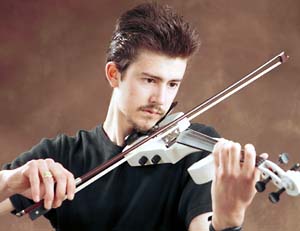When Jeffery Giering left his Portland, Ore., suburban home in 1999 to participate in the University’s Pre-freshman Program, it was — as Rick Blaine says at the end of Casablanca — the beginning of a beautiful friendship.

The Prefreshman Program gives entering first-year students detailed laboratory research experiences with University faculty the summer before their freshman year. It was in this program where Giering first worked with Craig S. Pikaard, Ph.D., professor of biology in Arts & Sciences, who specializes in genetics.
Immediately, Giering found Pikaard an invaluable mentor.
“Craig’s lab is a great place to get a handle on genetics techniques,” Giering said. “I can’t say enough about what I’ve learned from him and others in his lab. “He’s very clear and straightforward in describing things, and I’ve been exposed to so much and learned far more than I ever anticipated by working with him.”
Throughout most of his undergraduate career, Giering has worked in Pikaard’s laboratory alongside graduate students and postdoctoral researchers on Arabidopsis thaliana, a special plant that researchers use to study genetics.
Giering, who plans a gene-therapy career in either academia or industry, developed an interest in genetics at Tualatin High School in Oregon.
There he wrote an honors paper on gene therapy and was nurtured by his science teachers, whom he found “wonderful, but they were limited mainly to teaching by the textbook, and I was eager to do laboratory work,” Giering said. “Two big draws to coming to Washington University were the opportunity to do research so quickly and the financial support.”
The project Giering was involved with at the University was one that Pikaard originally intended for a doctoral-level student.
| College of Arts & Sciences |
Giering conducted a genetic screen of 8,000 Arabidopsis seedlings and came up with several mutant strains that are defective in DNA methylation, a complex biochemical function that is known to be a mechanism of gene silencing — where a gene exists but no longer performs its function. Gene silencing could become a major fac-tor in potential gene therapy strategies.
All the way up to today’s Commencement, Giering worked hard to make genetic maps of the mutations in hopes of identifying and characterizing the mutant variations.
Giering was an honors student with one of the most challenging majors in biology: biochemistry and molecular biology. The major is so rigorous that it requires a whole year of physical chemistry, extra mathematics and graduate-level courses.
He also majored in philosophy in Arts & Sciences. His lowest grade through his senior year was an A-.
He is the recipient of two prestigious awards this spring, the Stalker Award in biology and the Omicron Delta Kappa Outstanding Senior Award for scholarship, given by the Omicron Delta Kappa Leadership Honor Society.
“I rank Jeff among the best students I have known in my 13 years at Washington University,” Pikaard said. “He is clearly an exceptional student whom I’ve treated like a graduate student for several years.
“He’s the only undergraduate student working in my lab, and I’d rank him as an excellent second- or third-year graduate student. He needs minimal supervision and has a mature, professional manner.
“To top it all off, Jeff is a wonderful person with a great sense of humor and an unpretentious, easy-to-know personality.”
Giering’s mother, Cheryl, is an elementary-school special-education teacher; his father, Ken, is an executive for Nike. His brother, James, is a student at Linfield College in Oregon.
At the University, Giering continued two of his high- school pastimes, swimming and playing the violin. He played club water polo his first two years, and brings out his white electric violin to unwind from academic rigors. His favorites are Celtic reels and jigs.
This fall, Giering will begin work in Stanford University’s doctoral program in genetics. He’ll focus on human genetics and gene therapy because he wants to make contributions toward improving human health.
“One of the things that drives me is the desire to make breakthroughs in treating disease,” he said. “There are some promising gene therapy possibilities in metabolic diseases and cancer, and it’s exciting to think that I might be able to play a role.”